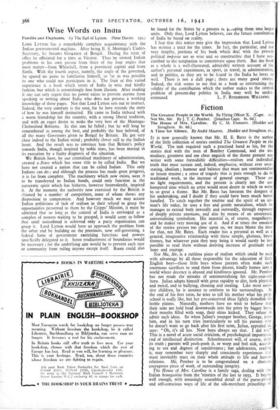Fiction
The House of Mrs. Caroline. By C. M. Framer°. (Hodder and Stoughton. 8s. 6d.) A Time for Silence. By Andre Maurois. (Hodder and Stoughton. 6s.) IT is now generally known that Mr. H. E. Bates is the author of the little collection of stories entitled The Greatest People in the World. The task required such a practised hand as his, for the
stories deal with the men of Bomber Command, and the im- mediacy, greatness and too close anguish of the theme present any writer with some formidable difficulties—realism and individual truth that must sustain and, indeed, emphasise, without ever over- stating, idealism ; humour and balance that must not sentimentalise
or lessen tension ; a sense of tragedy that is pure enough to do its traditional work, to the increase of general courage. These are no light requirements, and the present is _clearly not the un- hampered time which an artist would most desire in which to write to so great a theme. But Mr. Bates has foreseen the dangers of his undertaking, and I doubt if they could have been much better handled. To catch together the routine and the spirit of an air- man's life today, he uses a free and gentle naturalism, which he manages to extend both inwardly and outwardly, through exposure of deeply private emotions' and also by means of an unstressed, universalising symbolism. His material is, of course, magnificent. and he makeg very moving use of it. And if at times the emotion of the stories presses too close upon us; we must blame the time for that, not Mr. Bates. Each reader has a personal as well as a general, imaginative relationship with these simple, glorious, brave themes, but whatever pain they may bring it would surely be im- possible to read them without deriving increase of gratitude and hope and courage. Not Me, Sir, is a ruthless piece of realism which cnuld be read with advantage by all those responsible for the education of little English boys—those little boys whose parents often make such enormous sacrifices to send them from decent, kindly homes into a world where decency is abused and kindliness ignored. Mr. Pember has not made the mistake of sentimentalising his eight-year-old hero. Julian adapts himself with great rapidity to dirt, both physical and moral, and to bullying, cheating and stealing. Like most sensi- tive children, he is anxious to conform to his surroundings. At the end of his first term, he tries to tell his mother what his prep. school is really like, but her pre-conceived ideas lightly demolish his feeble plaints. Naturally, mothers have no wish to believe that their sons are held head downwards into the privy by bigger boys, their mouths filled with soap, their shins kicked. They .refuse to admit such ideas. So when Julian's younger brother, George, joins him, and in his turn tries inarticulately to tell his parents why he doesn't want to go back after his first term, Julian, appealed to, says: "Oh, it's all lies. New boys always say that. I did too." This is a novel of acute social criticism, of psychological importance, and of intellectual distinction. Schoolmasters will, of course, deny its truth ; parents will pooh-pooh it, or weep and feel sick, accord- ing to sex and degrees of sensitiveness; but adolescents, reading it, may remember very sharply and consciously experiences that must inevitably react on their whole attitude to life and human relations. Mr.. Pember is to be congratulated on a clearcut, courageous piece of work, of outstanding integrity. The House of Mrs. Caroline is a family saga, dealing with the Italian bourgeoisie from the 'nineties of the last to 1933. It begins well enough, with amusingly assembled detail of the purse-proud and self-conscious ways of life of the silk-merchant princelings of
Turin and their arrogant ladies—one lady in particular, Mrs. Caro- line ; but it trails withourdirection later, through a sketchy kind of history of one inept young Ferrero, parallelling his ill-defined life with a loose impression of Italian history. The book lacks form and direction, and is carelessly translated.
The silences of Colonel Bramble have served many readers well in their time. It is a pity that the silences—of which there are many—in M. Maurois' present long-short story should be so much less effective. The Romilly family live in Perigord—father, mother and daughter. In the past of each parent are certain episodes which they conceal from each other and from the girl Colette. Then Colette falls in love, the silences that enveloped the episodes are threatened and finally broken, and it appears that everybody knew or guessed everything all the time, but—once more—kept silent. Nothing could be more artificial than the construction of this melancholy little novelette, and it has not been helped by the
American-English employed by the translator. KATE O'BRIEN.



























 Previous page
Previous page